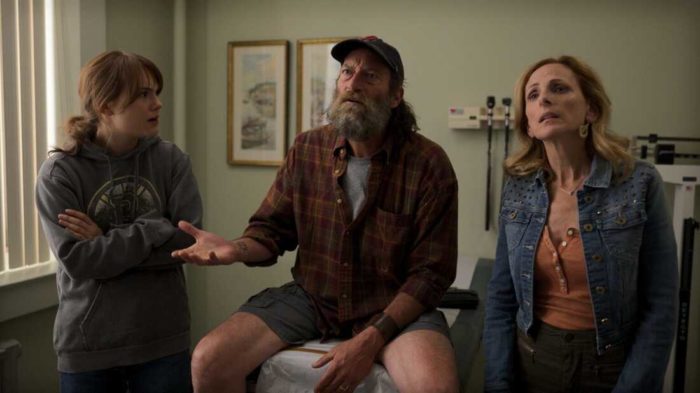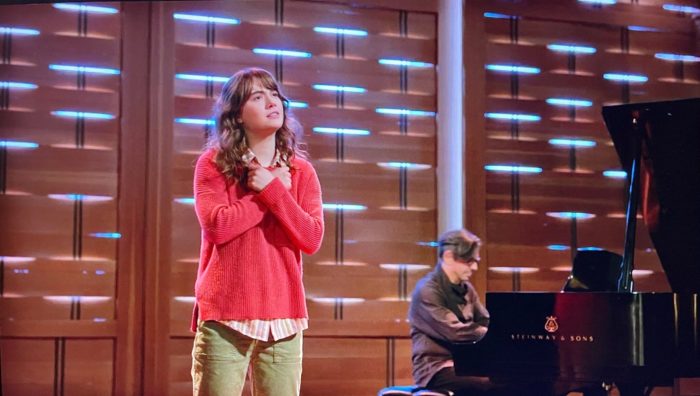
The 94th Academy Awards (2022)
Nominations: 3
Wins: 3
There is something about winning Best Picture that makes a film impossible to watch objectively. I know that literally everything is subjective and everybody loves to have hot or interesting takes on everything, but a Best Picture win is as close a thing as we have to proof that a movie is good or important or contains some artistic merit. This is unfortunate for a movie like CODA, which I’m sure I would have been perfectly charmed by if I’d seen it in the summer of 2021, knowing very little about it. But watching it now, a year after its underdog Best Picture win, I couldn’t help but judge it against the expectations of being a Best Picture winner and feeling a little disappointed because of it.
CODA takes place in Gloucester, Massachusetts, where 17-year-old Ruby (played by Emilia Jones) is the lone hearing member of an otherwise family of deaf people. Her dad Frank (Troy Kotsur) and brother Leo (Daniel Durant) work on a boat catching crab, while her mom Jackie (Marlee Matlin) is also involved in the family fishing business in ways that are a little vague. While the fishing business is struggling to stay afloat, Ruby is discovering her voice (literally), since she has joined an afterschool a capella group. She seems to have a real knack for music, so her somewhat eccentric teacher Mr. V (Eugenio Derbez) encourages her to keep singing, going as far as getting her to apply to Berklee College of Music. A conflict of sorts then starts to arise when Ruby decides that she doesn’t want to help out with her family’s business, while her parents seem intent on pressuring her to continue working for them.
The first thing that was a little perplexing to me about CODA‘s Best Picture win is that it felt a little like an indie throwback to me. It reminded me of the indie dramedy boom of the mid-00’s that resulted in Best Picture noms for Little Miss Sunshine and Juno, but if those movies had slightly less personality and slightly more warmth. That warmth is certainly appreciated, since I did care about this family ultimately, but there just wasn’t really anything surprising that happened over the course of CODA, even if the presence of so many deaf actors onscreen is a welcome sight when these types of handicapped communities are probably among the least represented in movies.
I suppose the one thing that I don’t really have a problem with in terms of the film’s Oscar love is Troy Kotsur winning Best Supporting Actor at last year’s ceremony, becoming the second deaf person to win an acting Oscar alongside his co-star Marlee Matlin. Katsur just has one of the all-time great character actor faces, and he’s absolutely perfect for playing this grizzled fisherman who has a penchant for the bass-y vibrations of gangsta rap. In fact, really all the performers are quite good, while I honestly could have used more of an in-depth look at how this New England fishing community operates than the bland high school problems that Ruby has going on.
Really my biggest issue with the movie, other than how few risks it takes, is how humdrum the filmmaking is. CODA doesn’t look or feel any more cinematic than your average streaming TV show, which I suppose is fine for a movie made on such a small budget that I’m sure no one involved in the making of expected to be a big awards contender. But I think there’s a reason why despite being a Best Picture winner, it wasn’t nominated in any of the craft categories.
But I don’t wanna harp on CODA too much. It’s a nice little movie that more or less accomplishes saying everything it wants to say. It’s not as embarrassing as Green Book or anything, since there’s nothing overtly offensive about it (although the deaf community seems to have some quibbles with it). Still, it’s perplexing how any Academy member could have voted for this over West Side Story or The Power of The Dog or Drive My Car, but hey, maybe coming out of the pandemic it was just time to honor something light and comforting.


